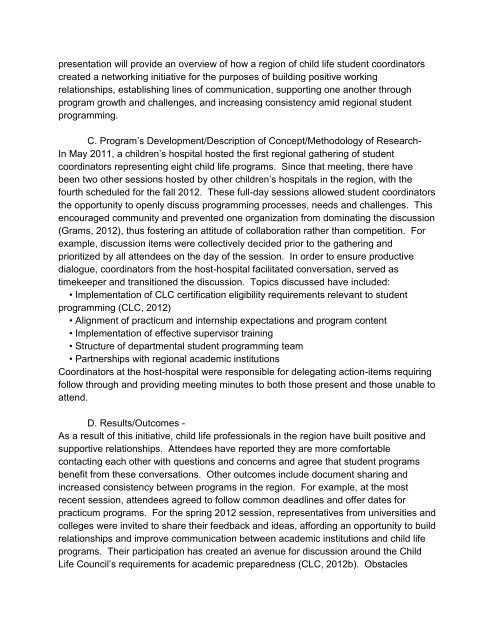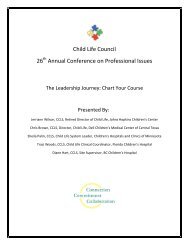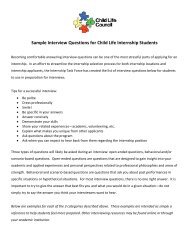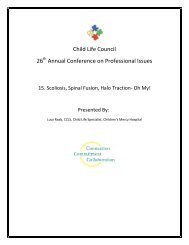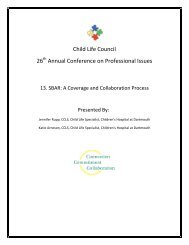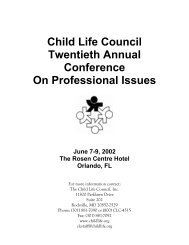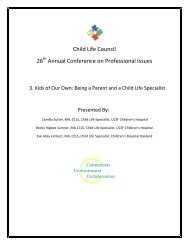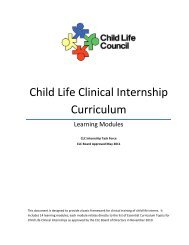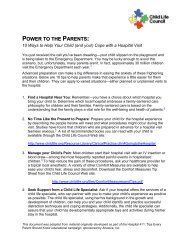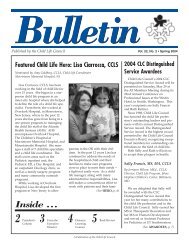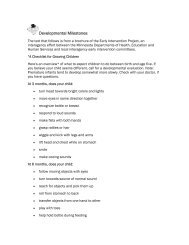Sample Abstract C - Child Life Council
Sample Abstract C - Child Life Council
Sample Abstract C - Child Life Council
Create successful ePaper yourself
Turn your PDF publications into a flip-book with our unique Google optimized e-Paper software.
presentation will provide an overview of how a region of child life student coordinators<br />
created a networking initiative for the purposes of building positive working<br />
relationships, establishing lines of communication, supporting one another through<br />
program growth and challenges, and increasing consistency amid regional student<br />
programming.<br />
C. Program’s Development/Description of Concept/Methodology of Research-<br />
In May 2011, a children’s hospital hosted the first regional gathering of student<br />
coordinators representing eight child life programs. Since that meeting, there have<br />
been two other sessions hosted by other children’s hospitals in the region, with the<br />
fourth scheduled for the fall 2012. These full-day sessions allowed student coordinators<br />
the opportunity to openly discuss programming processes, needs and challenges. This<br />
encouraged community and prevented one organization from dominating the discussion<br />
(Grams, 2012), thus fostering an attitude of collaboration rather than competition. For<br />
example, discussion items were collectively decided prior to the gathering and<br />
prioritized by all attendees on the day of the session. In order to ensure productive<br />
dialogue, coordinators from the host-hospital facilitated conversation, served as<br />
timekeeper and transitioned the discussion. Topics discussed have included:<br />
• Implementation of CLC certification eligibility requirements relevant to student<br />
programming (CLC, 2012)<br />
• Alignment of practicum and internship expectations and program content<br />
• Implementation of effective supervisor training<br />
• Structure of departmental student programming team<br />
• Partnerships with regional academic institutions<br />
Coordinators at the host-hospital were responsible for delegating action-items requiring<br />
follow through and providing meeting minutes to both those present and those unable to<br />
attend.<br />
D. Results/Outcomes -<br />
As a result of this initiative, child life professionals in the region have built positive and<br />
supportive relationships. Attendees have reported they are more comfortable<br />
contacting each other with questions and concerns and agree that student programs<br />
benefit from these conversations. Other outcomes include document sharing and<br />
increased consistency between programs in the region. For example, at the most<br />
recent session, attendees agreed to follow common deadlines and offer dates for<br />
practicum programs. For the spring 2012 session, representatives from universities and<br />
colleges were invited to share their feedback and ideas, affording an opportunity to build<br />
relationships and improve communication between academic institutions and child life<br />
programs. Their participation has created an avenue for discussion around the <strong>Child</strong><br />
<strong>Life</strong> <strong>Council</strong>’s requirements for academic preparedness (CLC, 2012b). Obstacles


